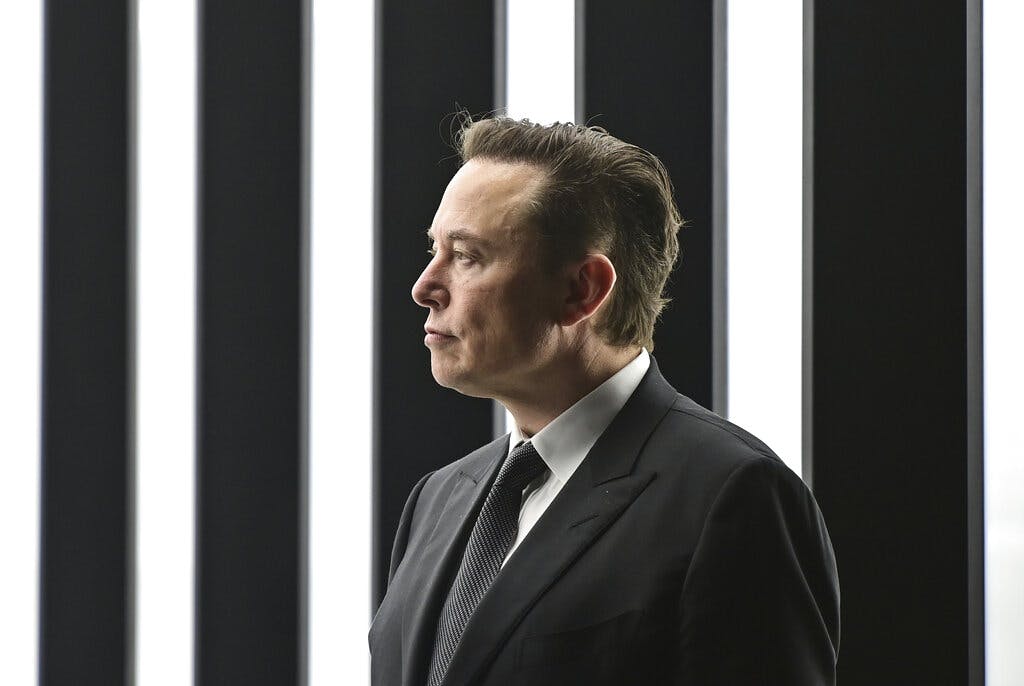Will Elon Musk’s Billions Spare Him From President Biden’s Tangled Web?
A brouhaha over the role of Starlink in the Ukraine war puts the bilious billionaire into damage control mode.

When it comes to things like global power and influence, Elon Musk and President Biden may be more best of enemies than bosom buddies. Drawn into the vortex of the war in Ukraine, Mr. Musk told his 156 million-plus followers on X this week: “I am a citizen of the United States and have only that passport. No matter what happens, I will fight for and die in America.”
Those unsolicited declarations come in the wake of Mr. Musk’s decisions about the uses in Ukraine of his SpaceX company’s Starlink satellite network, which have drawn renewed scrutiny following an excerpt from a forthcoming biography of the billionaire businessman. They have sparked public interest even more than his colorful family life — and his children bearing names as diverse as Exa Dark Sideræl Musk and Techno Mechanicus.
Even Senator Warren has entered the fray. On Tuesday, Ms. Warren stated, “Congress needs to investigate what’s happened here, and whether we have adequate tools to make sure foreign policy is conducted by the government and not by one billionaire.” Exactly what kind of tools the senator of Massachusetts has in mind was not immediately clear.
What Ms. Warren neglected to mention, though, is that the overarching reason Mr. Musk has been thrust into debate about the course of the war in Ukraine is the strategy vacuum created by the Biden administration. That is despite the billions of dollars in aid that Washington has poured into Ukraine since the Russian invasion in February 2022.
Mr. Musk has come under criticism from Ukrainian officials over Starlink and the role that it should have played, according to those officials, in what was reportedly a thwarted drone strike on the Russian fleet at the Russian-occupied Crimean peninsula last year. According to the new biography of Mr. Musk by Walter Isaacson, the attack was disrupted by Mr. Musk’s decision to disconnect Starlink to avoid what he thought could risk sinking the Russian fleet and trigger a “mini-Pearl Harbor,” or even provoke the Kremlin into starting a nuclear war.
Starlink has a global network of 4,000 satellites and in the early days of the invasion Ukraine received a large number of terminals that have been a boon for battlefield communications. Mr. Musk, who reportedly told Mr. Isaacson that “Starlink was not meant to be involved in wars,” disputes the notion that he pulled the plug on the service during the timeframe in question. On Thursday, he wrote on X, “The Starlink regions in question were not activated. SpaceX did not deactivate anything.”
To Ms. Warren’s point, Mr. Musk, though a private citizen, has wielded considerable clout in the conflict. The Department of Defense helped underwrite the cost of the more than 20,000 Starlink systems that SpaceX sent to Ukraine last year. Last autumn, Mr. Musk complained that it was still costing his company $20 million a month to support the communications services in the country and said the Pentagon should pay more than it had up to that point.
He reversed course on that, but not without some ire. In October 2022, he tweeted on the platform then called Twitter, “The hell with it … even though Starlink is still losing money and other companies are getting billions of taxpayer money, we’ll just keep funding [the] Ukraine government for free.”
It is his thoughts on Ukrainian territorial concessions, not financial considerations, that brought the heat on Mr. Musk. For one thing, he suggested last year that Ukraine recognize Russian sovereignty over Crimea. This week, he stated on X: “Both sides should agree to a truce. Every day that passes, more Ukrainian and Russian youth die to gain and lose small pieces of land, with borders barely changing. This is not worth their lives.”
To what extent, in the meantime, are Biden administration officials letting Mr. Musk’s quirky reputation dangle in the court of public opinion? Speaking on CNBC, Mr. Isaacson described a conversation between his subject and American officials. “Let us have a certain number of Starlink services and then later a more military version where we get to control it,” Mr. Isaacson said, recounting a conversation he had with Mr. Musk. “Elon Musk said, ‘Yes,’ and that’s the right outcome,” Mr. Isaacson added.
The debate on the use — or non-use — of Starlink’s technology for all its potential in Ukraine, and presumably other conflict zones, may only be beginning. If Mr. Musk’s particular stance on Russia’s role is now giving him cause to defend his loyalty to America — on the social media platform he now owns — who exactly is caught in whose web?
Mr. Musk’s vast fortunes won’t keep him out of the limelight as it takes on strange hues, nor is it clear whether he objects to finding himself the center of attention. President Biden is, despite his age, a canny operator, and there is an election coming up. Mr. Musk’s social media company is now, for unrelated reasons, coming under scrutiny from the Department of Justice. The present dust-up between the billionaire and the Washington establishment is overheated and complex, but one thing is simple: Despite appearances, a certain catbird seat still belongs to President Biden.

